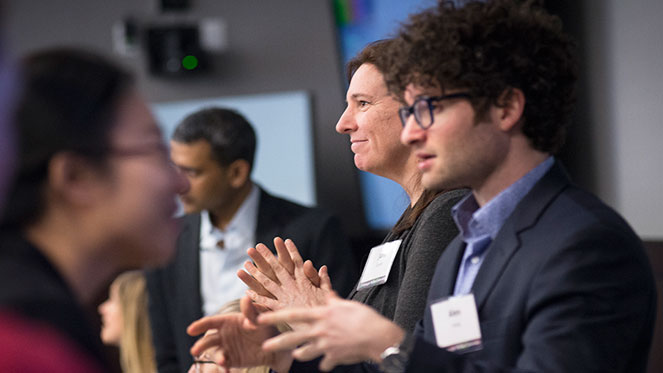
Infinite Career Paths in Behavioral Economics
Carnegie Mellon University recently launched the first-of-its-kind undergraduate major in behavioral economics, policy and organizations (BEPO) because of the high demand for trained behavioral economists in almost every industry and sector. To give students an idea of many potential career options, the Department of Social and Decision Sciences (SDS) hosted "Behavioral Insights in Action."
"This was a really unique and exciting opportunity to bring back some of our graduate student alumni from our top-ranked behavioral decision research program and showcase their work alongside other experts from industry and government as well as our own, really spectacular, faculty members," said Linda Babcock, head of SDS in the Dietrich College of Humanities and Social Sciences who spearheaded the creation of the new major.
Behavioral economics is an interdisciplinary field that integrates perspectives from economics and psychology to understand and predict human behavior in economic contexts. Students who attended the conference attended panel discussions and networking sessions, and the industry topics represented the finance, human resources, entertainment, marketing, technology and retail sectors. Government and public policy panelists covered a range of issues, from poverty and corporate compliance, to discrimination and sex education.
The breadth of work presented impressed Amelia Britton, a junior Science and Humanities Scholar. She said that, "Behavioral Insights in Action" helped her see how "real results make a difference in the public sector."
Babcock, the James M. Walton Professor of Economics, was one of the influential CMU speakers. She shared some of her experiences advising the White House and technology leaders on equal pay for women. She is the co-author of "Women Don't Ask: Negotiation and the Gender Divide," which was named one of Biz Journals’ 20 Most Important Business Books Ever Written.
"I say that CMU’s behavioral economists are spectacular, and it’s really true. If you just look at a few of the examples they gave about their work — from devising ways to help people save for retirement to helping teen girls avoid becoming pregnant, it’s impressive. Our focus on adding the psychological and behavioral aspects to economics is what makes the work stand out," Babcock said.
Three SDS doctoral students described their recent internships. Interning with Google's People Analytics group, Rich Truncellito used human resource data to improve work performance and quality of life for employees. At Irrational Labs, David Hagmann studied how to incentivize people to make decisions that impact their health and finance.
Talya Lazerus did a user experience internship at AirBnB where she implemented A/B testing and worked to make customer-focused improvements.
"In my internship, I gained good professional experience in qualitative research by talking with people, and then I applied my background in behavioral economics to explain my findings quantitatively," said Lazerus.
Halley Bayer, a recent graduate, said the conference gave her "new insights in the field." Junior Sophia Weisman was eager to listen to the experts and graduate students.
"It was especially interesting to hear about different types of internships," Weisman said.
Students who major in BEPO will be uniquely trained in the integration of economics and psychology and will have a solid grounding in quantitative methods. Applied projects in courses will teach students how to collect original data, design field and laboratory experiments and analyze data using a variety of methods.
If an employer seeks to recruit a behavioral economist, Carnegie Mellon is the place.
"Employers have already been eager to hire SDS graduates for their strong foundation in behavioral science, and the new BEPO major adds to our portfolio," said Connie Angermeier, coordinator of student programs in SDS.
Eugene Chung, a junior and decision science major, has broad interests in finance and strategic marketing that he wants to apply this summer in an internship.
"The many applications of the social and decision sciences, including behavioral economics, make it a very appealing area to study. It's really about judgment and decision making, which to me is fundamental," said Chung.
The conference's concluding keynote lecture underscored the field's growing fascination and increasing value. George Loewenstein, a co-founder of behavioral economics and the Herbert A. Simon University Professor of Economics and Psychology, presented "The NEW New Economics of Information" to a full room in Hamburg Hall.
Loewenstein began by referencing Nobel Laureate and economics forefather George Stigler and his breakthrough publication "The Economics of Information." He then presented his research and gave examples of dilemmas of today's business strategists and consumers that have become complicated by technology and new media.
Mark Kamlet, University Professor of Economics and Public Policy and Provost Emeritus, described the keynote lecture as "a tour de force."
The event left a last impression on attendees, including Emily Vokach-Brodsky, a senior whose interests lie in public health and epidemiology.
"The fact that we have this conference is a really cool opportunity for students. To have all of the experts here together discussing real world applications of our majors, it's inspiring," Vokach-Brodsky said.